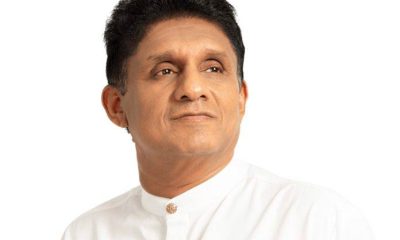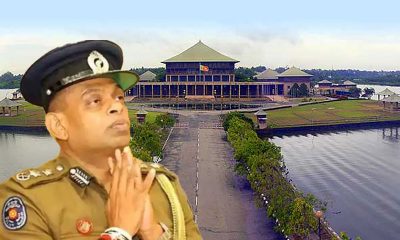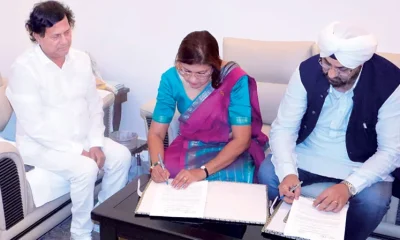Business
CSE’s newest digital push expected to make it worth US$ 60 billion in 5 years
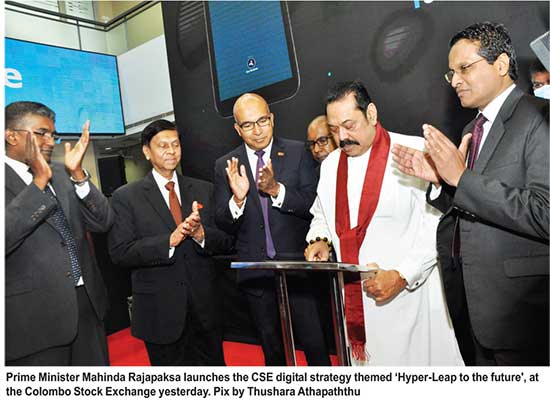
by Sanath Nanayakkare
The Colombo Stock Exchange (CSE) with its newest digitalization drive should do well enough in the next 5 years to accumulate a market capitalization of US $ 60 billion, Ajith Nivard Cabraal, State Minister of Money and Capital Market and State Enterprise Reforms said yesterday.
“Then the Colombo Stock Exchange will have a capacity which can provide funding not only to the government sector but also to the private sector making sure that the President’s goals of prosperity will be achieved,” he said.
Minister Cabraal made these remarks on the trading floor of the Colombo Stock Exchange (CSE) yesterday at a special market opening ceremony where Prime Minister Mahinda Rajapaksa launched a new digital platform for CSE, enhancing the investment experience for investors, stockbrokers, listed companies and other stakeholders.
The digital strategy themed ‘Hyper-Leap to the future’ is formed to digitalise all stakeholder touchpoints enabling end to end connectivity electronically. It will position Sri Lanka to become a global financial hub redefining the stock market landscape.
Elaborating on his point the state minister said,” As a person who on been involved in the stock exchange and securities matters for a long time in various capacities, I know how difficult it is to get a project of this nature going. I know you have put in a lot of work. Way back in 1993 at the time I was the president of the Institute of Chartered Accountants, we organized the mCentral Depository System (CDS) for the first time. I think that was a revolution – a special one- because all the brokers who were struggling with share certificates and documentation were suddenly relieved of all these duties and they could go out and sell, go out and make the market a lot more vibrant. I see an opportunity like that once again,
“The digitalization will take away from brokers as well as market players a lot of paperwork and mundane tasks that have been so far done by you personally. When you are relieved of these duties I am sure you will find enough time to make the market work more efficiently and productively. You need to have buyers whose numbers are increasing and you need to have sellers who will be providing the supply of shares in this business. This means you need to focus on these vital areas and aspects in the market.
“You have got to make sure that the number of shares you have is expanded regularly. I have been around long enough to know that the number of companies that have been trading on the stock exchange has remained almost stagnant for so many years. Every time when someone asks how many companies are there on the stock exchange, we say 200 something. I think this ‘200 something’ has been the number for the last 30 years. So, 5 years from now, we’d like to see this number being spoken of as ‘500 something’. I think you all can do that. As CSE chairman already mentioned there is an effort to make these numbers grow. There is ample opportunity. If all of you take the pains to do that, you can make it happen.
“In 2014, when President Mahinda Rajapaksa relinquished office at the end of 2014 – the market capitalization of CSE was 25 billion dollars. By the end of 2019, it came down to just half of that. – only 12 ½ billion dollars, marking a massive drop. We need to grow this market again. We need to make sure that your efforts are directed towards making the market to expand. The Director General of SEC said, you want the government to come here and use this as a repository of funds. With a 12 ½ billion dollar market cap, I don’t think you can do that. So set your sights high. Set your sights at US $ 60 billion dollars, if I may suggest, for the next 5 years. Then you will have a capacity which can provide funding not only to the government sector but to the private sector making sure that the President’s goals of prosperity will be achieved.
“My Friends, we have our work cut out. The President and the Prime Minister have given you the indication that support will be extended to the stock exchange. I have been appointed as state minister in order to make us responsible for that task. So, I personally will be supporting you. I would like to see you take the direction to move forward. Now you have digitalization in place. I think you need to build on that foundation. There will be plenty to do to achieve our goal. You have got to make sure that you bring in capital that will support the market. This is not going to be easy. I remember from 2007 onwards we were going abroad, we were making sure that capital was adequate in this country.- When we could not raise it globally, we raised it from foreign sources. So, you need to do that. You need to provide capital to companies and you need to provide capital so that new instruments could also be put in place in this country. It would be of total relevance to see an SME Board, a Startup Board, an IT Board and maybe a mechanism to list the BOI companies also on the stock exchange. This means there ‘s plenty of space. Now that you have had the first hurdle cleared, the next is also going to be exciting and we’d like to see you take it up from here. Together we can usher in an era of prosperity in our country with the participation of a truly representative investor community,” he said.
SEC chairman President’s Counsel Viraj Dayaratne, SEC Director General Chinthaka Mendis, CSE chairman Dumith Fernando, and CSE CEO Rajeeva Bandaranaike also spoke at the event.
Business
President AKD writes to President Trump over trade deficit concerns
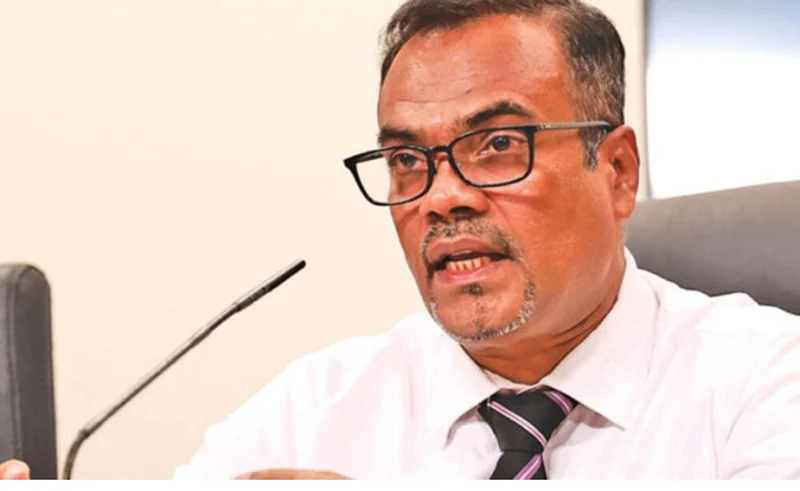
In a bid to address mounting trade tensions, the Sri Lankan government has intensified efforts to reduce its significant trade deficit with the United States, Deputy Minister of Economic Development Dr. Anil Jayantha Fernando announced in parliament yesterday. He added that President Anura Kumara Dissanayake has despatched a formal letter to President Trump urging, among other things, a re-assessment of the recent enhanced tariff regime imposed on Sri Lanka.
The move follows reciprocal tariffs imposed by U.S. President Donald Trump, which Sri Lankan authorities say significantly affect key export sectors. The Deputy Minister indicated that the White House has acknowledged receipt of the Lankan President’s letter, signaling the launching of a potential bilateral dialogue.
Responding to a question raised by New Democratic Front (NDF) MP Ravi Karunanayake, Deputy Minister Fernando revealed that 88% of Sri Lanka’s trade deficit over the past five years stemmed from U.S. trade relations with apparel, rubber products, spices, other agricultural products and precious gems constituting 85% of total exports to the U.S. These exports, he noted, already face tariffs and paratariffs, but President Trump’s recent levies were calculated based on bilateral trade imbalances – a factor that has placed Sri Lanka’s economy under heightened pressure.
“The President’s intervention underscores our commitment to protecting Sri Lankan industries and fostering equitable trade terms, Fernando stated, defending the administration’s proactive and reactive measures to mitigate the US tariffs’ impact on local businesses.
Highlighting ongoing engagement, he added that another round of high-level discussions with the Office of the U.S. Trade Representative (USTR) was scheduled overnight. These talks aim to address structural trade imbalances and explore avenues for tariff relief, particularly for Sri Lanka’s apparel sector, which employs millions nationwide.
The President’s letter marks a strategic move in Sri Lanka’s diplomatic outreach, reflecting the government’s urgency to stabilise an economy still recovering from recent crises while in the middle of an IMF programme.
Sri Lankan industry leaders have cautiously welcomed the government’s efforts but emphasise the need for swift, tangible outcomes.
At present, all eyes remain on Washington’s response to President Dissanayake’s appeal – a potential turning point for Sri Lanka’s trade future, observers noted.
By Sanath Nanayakkare
Business
Inclusive and sustainable apparel for SDGs
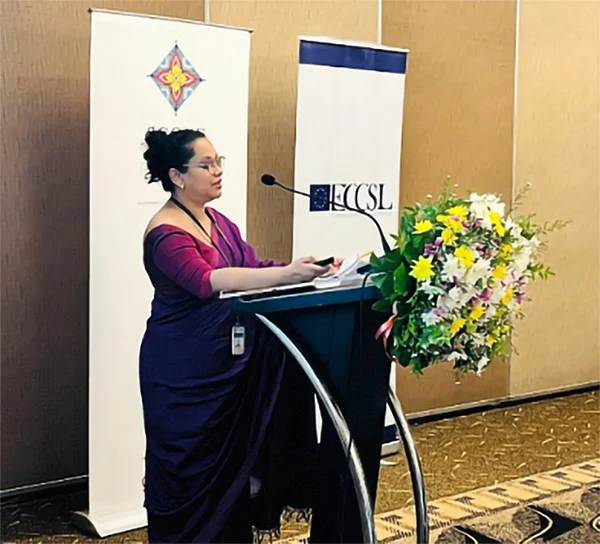
The European Chamber of Commerce of Sri Lanka (ECCSL), in collaboration with the Strengthening Social Cohesion and Peace in Sri Lanka (SCOPE) programme, recently hosted its third industry-focused event, bringing together apparel-sector stakeholders to exchange experiences and practical insights on embedding inclusivity and sustainability into business operations.
Building on the success of ECCSL’s earlier events focused on tourism and food and agriculture, this apparel-focused gathering convened government representatives, industry leaders, business practitioners and the academia to discuss practical strategies for embedding inclusivity and sustainability into business operations.
While many businesses already recognize the importance of these principles, the event emphasized practical implementation, shifting the conversation from the “why” to the “how” of inclusive and sustainable practices.
Chamindry Saparamadu, Director General of the Sustainable Development Council of Sri Lanka, discussed how the Government of Sri Lanka is supporting businesses to create social and environmental impact through its Inclusive and Sustainable Business (ISB) Strategy. Ms. Saparamadu outlined how this strategy aims to create a resilient, equitable, and sustainable economy by building an ecosystem in which inclusive and sustainable businesses can thrive, driving transformative change across industries.
The event also featured engaging presentations from leading apparel businesses—Omega Line, Hirdaramani, and Compreli Consulting—each showcasing real-world examples of how inclusivity and sustainability can be embedded into business operations.
Omega Line, represented by Saman Jayasinghe (Chief HR Officer, Group – Administration) and Charman Dep (Assistant General Manager – Production Planning), presented its multifaceted sustainability approach, spotlighting its Vavuniya factory as a successful model for combining environmental stewardship with social impact.
Hirdaramani’s Manindri Bandaranayake (Chief Brand & Sustainability Officer for Sri Lanka, Bangladesh, Ethiopia, and Vietnam) showcased the company’s holistic sustainability framework, including its Wonders of Wellbeing (WOW) program, policies supporting differently-abled individuals, and deep community engagement.
Finally, Compreli Consulting co-founders Ramesh De Silva and Shehan Olegasageram showcased their innovative garment repair-as-a-service model—a circular, scalable solution that reduces waste and carbon emissions, while aligning with evolving global sustainability regulations.
Participants then had the opportunity to share their own knowledge in a group discussion, exchanging experiences and reflecting on the challenges and opportunities encountered in their sustainability journeys.
The event underscored the collective benefit of building Sri Lanka’s reputation as a global leader in inclusive and sustainable business. By fostering collaboration between businesses, the academic community and government stakeholders, the session aimed to accelerate broader industry adoption of these principles and contribute to Sri Lanka’s sustainable economic growth.
The discussions were facilitated by the Project Lead of ECCSL’s Inclusive Business Practices project, William Baxter.
Business
Union Assurance records Rs. 5.2 Billion PBT, fortifying its financial position by delivering best-in-class value

Union Assurance PLC, Sri Lanka’s longest-standing private Life Insurer, has recorded a strong financial performance with growth across key metrics for the year ending December 31, 2024. The Company achieved a 15% growth in gross written premium, totalling Rs. 21.6 billion driven by double-digit growth in both regular new business premiums and renewal premiums and paid Rs. 7.7 billion worth of claims and benefits to its customers during the year. In addition, for the year ending December 2024, the Company also declared an industry-leading universal life policyholder dividend rate of 12%, underscoring its continued commitment to deliver exceptional value to its customers.
Net investment income recorded a 9% year-on-year growth to reach Rs. 11.8 billion aided by an effective asset allocation strategy. The gains from the trading investment portfolio increased by 123% to reach Rs. 2.9 billion driven by the strong performance of the Colombo Stock Exchange during the latter part of the year.
Union Assurance distributed Rs. 3 billion as surplus from the policyholder fund and reported a profit after tax of Rs. 3.7 billion for 2024. The Company declared a final shareholder dividend of Rs. 5.00 per share amounting to a total payout of Rs. 2.9 billion.
A key milestone for Union Assurance in 2024 was the surpassing of Rs. 100 billion in total assets for the first time in its history, ending the year with Rs. 109.5 billion. This underscores the Company’s solid financial foundation and growth trajectory.
The Company’s assets under management grew by 15% during the year, reaching Rs. 95.6 billion driven by market valuation gains and cash generation from business operations. Furthermore, Union Assurance’s capital adequacy ratio stood at a healthy 264% at the end of 2024, well above the regulatory minimum of 120%.
-

 Business2 days ago
Business2 days agoColombo Coffee wins coveted management awards
-

 Business4 days ago
Business4 days agoDaraz Sri Lanka ushers in the New Year with 4.4 Avurudu Wasi Pro Max – Sri Lanka’s biggest online Avurudu sale
-

 Features3 days ago
Features3 days agoStarlink in the Global South
-

 Business5 days ago
Business5 days agoStrengthening SDG integration into provincial planning and development process
-

 Business4 days ago
Business4 days agoNew SL Sovereign Bonds win foreign investor confidence
-

 Sports6 days ago
Sports6 days agoTo play or not to play is Richmond’s decision
-

 Features3 days ago
Features3 days agoModi’s Sri Lanka Sojourn
-

 Sports5 days ago
Sports5 days agoNew Zealand under 85kg rugby team set for historic tour of Sri Lanka




